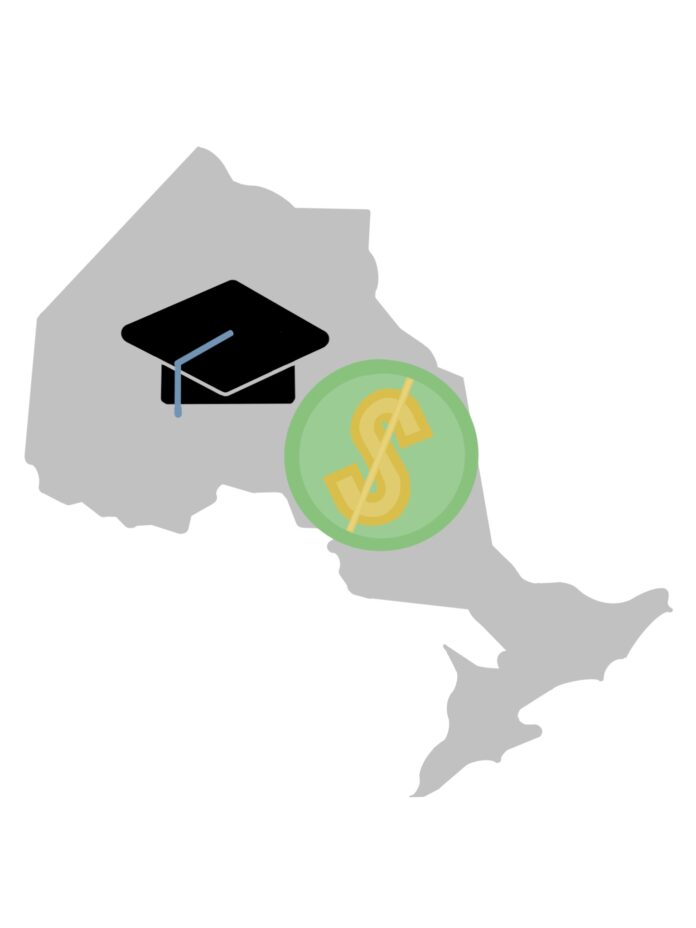In 2020, the Canadian government doubled its contribution to the Ontario Student Assistance Program (OSAP) with the promise to continue to invest this amount for two years. However, according to the Ontario Undergraduate Student Alliance (OUSA), it appears this investment has not trickled down to students, as the government of Ontario is using the increased funding to minimize its own contribution to OSAP.
In the 2021 Ontario budget, the provincial government announced its planned OSAP expenditure for the 2020-2021 year would be $895 million, down from $1.29 billion in the previous year. This amounts to a decrease of $400 million.
Since May, OUSA has been advocating for a stop to this clawback by sending letters to Ross Romano, Ontario’s former minister of Colleges and Universities, and engaging leaders at all levels of government. They have also contacted the opposition critic for Colleges and Universities, Laura Mae Lindo, who sent a letter on behalf of OUSA.
However, none of these letters have been answered. WUSA vice-president education, Stephanie Ye-Mowe, is part of the OUSA team advocating for greater transparency from the provincial government. Ye-Mowe stated in an interview, “The minister has changed, but nothing has changed in terms of responsiveness.”
Due to this lack of responsiveness, OUSA has begun a social media campaign, as well as a letter-writing campaign, to motivate students to write to their MPPs about the issue.
“There is the possibility this is a whole misunderstanding, but it’s a pretty big accusation, and the fact that we’ve heard absolutely nothing from the ministry is definitely concerning,” said Ye-Mowe.
Ye-Mowe said this issue could be resolved by clarification from the Ontario government.
“There’s still the possibility here that maybe less students enrolled, maybe they [students] just didn’t have as much financial need.”
It’s worth noting that the provincial government has expanded eligibility for OSAP. Beginning in the 2020-2021 academic year, students in eligible programs at Indigenous Institutes and some micro‐credential programs can apply for financial assistance through OSAP.
However, Ye-Mowe added that “there are multiple factors leading us to believe that Ontario has essentially used the additional funds that the federal government has given to the province (intended for the province to then distribute to students) and have just taken this for themselves.”
One of these factors is the discrepancy between student financial aid increases in other provinces and territories in comparison to Ontario.
“Other provinces have given it to students and in some cases have matched the additional funding so it’s really telling that in Ontario they’ve decided to balance the budget on students’ backs.”
Ye-Mowe highlighted the time-sensitivity of this issue, and the need to have the issue addressed before the next budget is tabled, as the federal government has committed funding to OSAP for an additional two years.
“This year didn’t quite pan out for students, but it means that if this isn’t addressed, and we don’t get answers we’re getting ripped off for another two years.”
OUSA members say they worry that this clawback could set a bad precedent that could lead to decreased funding from the federal government in the future. Essentially, they said they fear a misappropriation of federal contributions will cause the federal government to become hesitant to increase funding to the provinces in the future.
There are many ways University of Waterloo students can get involved to help advocate for transparency and funding from the provincial government, including the letter-writing campaign. Ye-Mowe suggests students should advocate for themselves in whichever way they feel most comfortable, be that memes on Reddit or raising awareness amongst their friends.
“I would ask students to inform other students and make a big splash about it…mobilizing people and having that energy really lies within the students and I do think this impacts them a lot. So showing that they care, getting other students to care, making noise, is what we really need right now.”
The provincial and federal governments did not respond to Imprint’s request for comment in time for publication.































